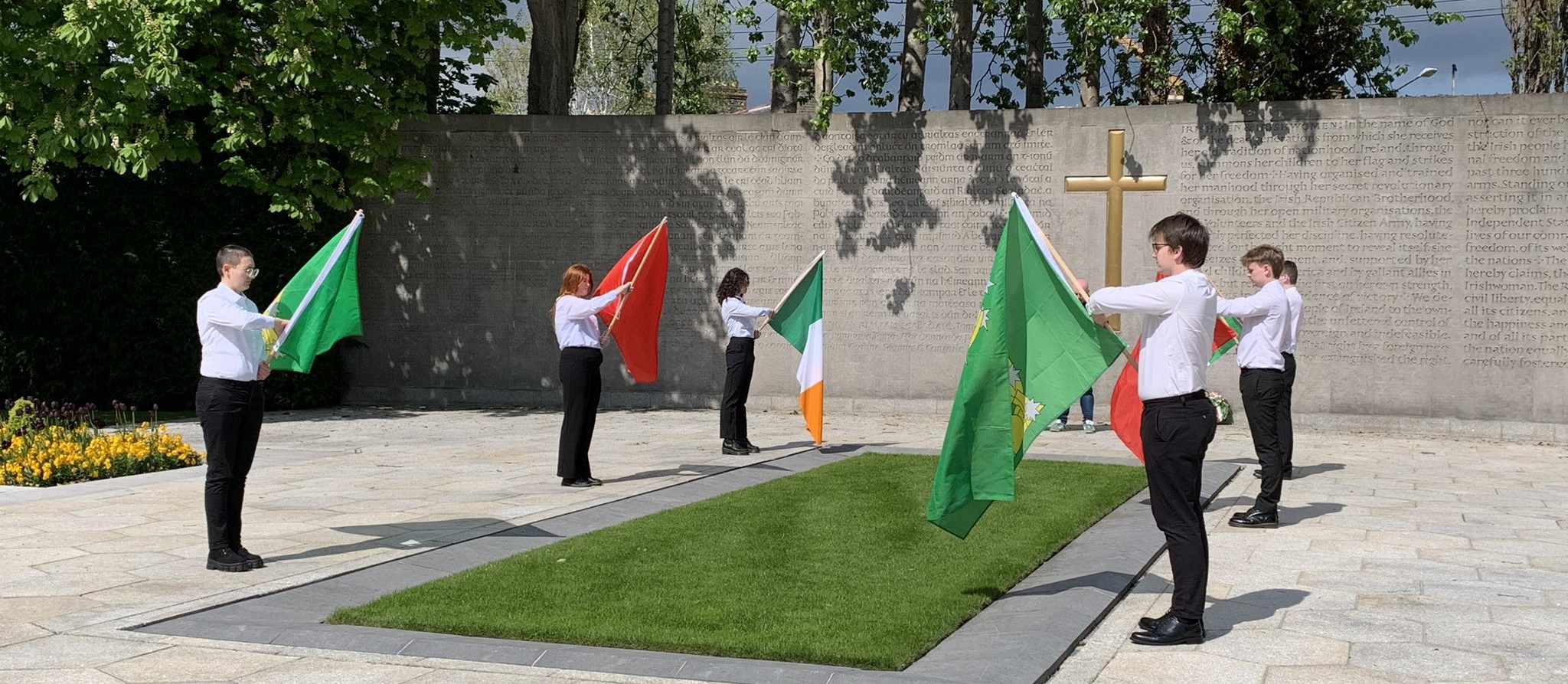Easter is upon us, and Irish republicans across the country – and the world – have gathered to commemorate the Easter Rising and those who have struggled for a free Ireland.
Commemorations have taken place on Easter Saturday, Sunday, and Monday. The CYM will also be hosting a commemoration on 20 April – closer to the historical date.
Thousands have turned out across the country, and various groups have organised commemorations. It prompts the question; why do these momentous events of 108 years ago still speak to us?
The Rising speaks to us because its vision remains unfulfilled, and because its real causes are far more relevant than many would wish to admit. The Rising was not an act of blind heroism, nor was it a Rising that came out of nowhere.
The text of the Proclamation speaks to this very fact:
“The right of the people of Ireland to the ownership of Ireland”
The significance of this line is two-fold.
At a national level, it is a reaffirmation for what republicans have sought for centuries. “Ireland her own, and all therein, from the sod to the sky”. It reasserts our right to self-determination against colonialism. Then, just as now, Ireland remains occupied by Britain. Anyone who invokes the spirit of 1916 yet is silent on the continued occupation of the six counties reveals themselves to be opportunistic Free Staters.
However, the vision of the Proclamation is far more than just national freedom. In the lead-up to the Rising, Dublin was a colossal slum, renowned for its abysmal housing situation. More than 20,000 families were living in single-room accommodation, with many city councillors being landlords of such tenements themselves. This was not lost on the writers of the Proclamation who knew the full meaning of freedom, and was not lost on the rebels of 1916 who fought for a better future.
James Connolly made this clear in an article leading up to the Rising;
We are out for Ireland for the Irish. But who are the Irish? Not the rack-renting, slum-owning landlord; not the sweating, profit-grinding capitalist; not the sleek and oily lawyer; not the prostitute pressman – the hired liars of the enemy. Not these are the Irish upon whom the future depends. Not these, but the Irish working class, the only secure foundation upon which a free nation can be reared.
Connolly was clear on what was meant by an Ireland owned by its people. Patrick Pearse too was clear on this, as he declared in 1913 that his “instinct is with the landless man against the lord of lands, and with the breadless man against the master of millions”. He reasserted this principle in The Sovereign People in March 1916:
The nation’s sovereignty extends not only to all men and women of the nation but to all material possessions of the nation, the nation’s soil and all its resources, all wealth and wealth-producing processes within the nation. In other words, no private right to prosperity is good against the public right to secure strictly equal rights and liberties to every man and woman within the nation.
With this it is clear that the leaders of 1916, those who wrote the Proclamation, were not interested merely in self-government, but national, economic, and social freedom.
But of course Ireland in 2024 is the opposite; the “right” to private property and landlord profits is upheld with upmost sincerity by the government who deploy the Gardaí to viciously attack people resisting eviction, whilst thousands continue to go homeless, and many more spend most of their income on single-room accommodation.
It is no surprise then that the landlord-filled parties often overlook the genuinely liberatory vision of 1916 when they pay their hypocritical lip service to the men and women of the Rising.
The same hypocrites, some who even call themselves “republicans”, similarly make a mockery of the vision of “equal rights and equal opportunities” pledged in the Proclamation. What opportunities are there for the young people of Ireland compared to the Airbnb landlords and housing speculators?
We have so-called “republicans” today who act like the Home Rulers did in Pearse and Connolly’s day. They line up to pay homage to the dead who dared for freedom, yet their actions only reinforce the interests of imperialism. They stand around for their photoshoot and say a few words, but next week – and every other week – they slander and attack those who dare to do something to make these principles a reality. After all, a long-dead rebel is far less of a threat to their interests than a living one.
However, it is not enough to wax lyrical or to criticise. When remembering 1916 – and every other attempt at freedom – it is important that we learn from it.
Those who went out in 1916 were not mythical heroes, they were overwhelmingly young workers. Nor did the Rising happen out of nowhere; it was the result of years of dedicated organising, political education, and agitation. Those who went on to fight in 1919 had learnt this, and had built a mass movement to sustain the struggle, until it was betrayed in 1921.
What has been lost before can be won now, but only if we commit ourselves to the tasks at hand, and are ready to become risen people.
And I say to my people’s masters: Beware,
Beware of the thing that is coming, beware of the risen people,
Who shall take what ye would not give.
Did ye think to conquer the people,
Or that Law is stronger than life and than men’s desire to be free?
We will try it out with you, ye that have harried and held,
Ye that have bullied and bribed, tyrants, hypocrites, liars!– Patrick Pearse

